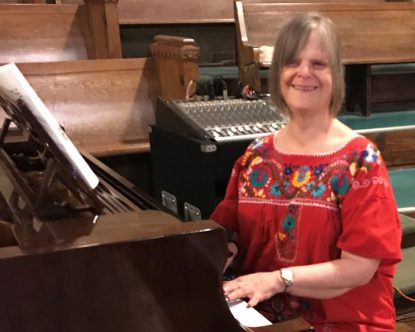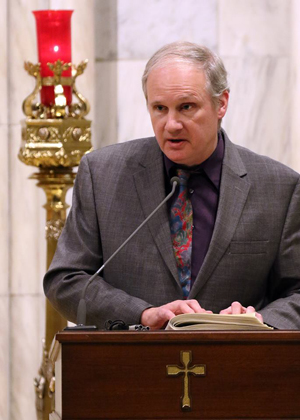
Suzanne Erb prepares to play piano and cantor for a recent Saturday evening Mass at her parish, Our Lady of Hope in Philadelphia.
Every other week Suzanne Erb of Our Lady of Hope Parish on North Broad Street in Philadelphia plays the piano and cantors at the 4:30 p.m. Vigil Mass. That in itself is not unusual; in many small parishes musicians do double duty.
What is special is that Erb is blind; literally everything she does has to be memorized in advance. You can’t play the piano and read Braille simultaneously.
A real bonus for her is to have copies of the Mass readings and Propers ahead of time, either audibly or in Braille, so that she can tailor the music to those readings and prayers.
Erb’s task is made much easier through materials provided by the Xavier Society for the Blind, a little-known nonprofit headquartered in New York that provides Catholic-themed materials, including Mass readings.
[hotblock]
It was founded by Jesuit Father Joseph Stadelman as a publishing house to make writings on religion and spirituality available to the blind. Early in its history it transcribed the entire Bible into Braille, and more recently has done the same thing for the current Catechism of the Catholic Church.
The society takes its name from where it was founded in 1900: the College of St. Francis Xavier, now Xavier College Preparatory School.
The Xavier Society’s mission statement really tells the story: “To provide the Word of God and the best of Roman Catholic teaching and literature, spiritual and inspirational material, to blind or visually impaired persons of any faith in whatever format best suits their needs at no charge.”
“No charge” means exactly that, according to Malachy Fallon, the executive director of the Xavier Society for the Blind. There is no fee for the material supplied or membership fees for belonging.
“I’ve been here for about three years and feel very fortunate to be part of the organization. The mission is so important,” he said.

Bill McCann of St. Isaac Jogues Parish in Wayne proclaims a reading from Scripture using a version in Braille. (Photo by Gregory A. Shemitz)
While Braille was the only medium available for the blind when the society was founded, now there are other media available including audio books.
But Bill McCann, a member of St. Isaac Jogues Parish in Wayne, still prefers Braille, which he learned as a child at St. Lucy Day School in Philadelphia. He relies on the Xavier Society for the Mass readings and other publications that he can read.
Today, many blind children are mainstreamed in public schools, and a lot of them don’t learn Braille, he explained. This type of education has good points but a downside too.
Because they mostly learn through recordings, they miss the nuances of written language, for example spelling, and consequently many of the children are poor spellers. “I see that in letters I get,” McCann said.
A trumpeter and avid music lover, he has developed a program that transcribes printed music scores into a code similar to Braille.
He is also active with the Xavier Society and has served on its board. He especially loves the annual Mass that the society celebrates in New York annually for the feast of St. Lucy, the patron saint of the blind.
But in some ways the Xavier Society, which is fully recognized by the U.S. Conference of Catholic Bishops, is a hidden gem. It is serving about 2,000 people annually but could easily serve more, according to Fallon.
If you know someone who is blind and would like to receive free Catholic religious materials, check out the society’s website at XavierSocietyfortheBlind.org, email them at info@xaviersocietyfortheblind.org or call 212-473-7800.
PREVIOUS: Appeals court says Pa. county seal can keep its cross
NEXT: Biking, praying, sharing: Seminarians roll into St. Agnes, Sellersville



Share this story